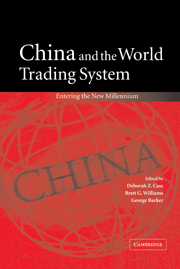Book contents
- Frontmatter
- Contents
- List of figures
- List of tables
- List of contributors
- Preface
- Acknowledgements
- Abbreviations and acronyms
- Introduction: China and the reshaping of the World Trade Organization
- PART I The world trading system
- PART II The accession
- PART III China – the domestic sphere
- PART IV Trade in goods
- PART V Trade in services and competition policy
- 13 WTO membership and professional services regulation in China
- 14 The impact of China's WTO accession upon regulation of the distribution and logistics industries in China
- 15 Regulating the new economy: implications of WTO accession for telecommunications and e-commerce in China
- 16 Segregation and convergence: the Chinese dilemma for financial services sectors
- 17 Adopting a competition law in China
- PART VI Intellectual property
- PART VII Dispute settlement
- Select bibliography
- Index
17 - Adopting a competition law in China
Published online by Cambridge University Press: 28 July 2009
- Frontmatter
- Contents
- List of figures
- List of tables
- List of contributors
- Preface
- Acknowledgements
- Abbreviations and acronyms
- Introduction: China and the reshaping of the World Trade Organization
- PART I The world trading system
- PART II The accession
- PART III China – the domestic sphere
- PART IV Trade in goods
- PART V Trade in services and competition policy
- 13 WTO membership and professional services regulation in China
- 14 The impact of China's WTO accession upon regulation of the distribution and logistics industries in China
- 15 Regulating the new economy: implications of WTO accession for telecommunications and e-commerce in China
- 16 Segregation and convergence: the Chinese dilemma for financial services sectors
- 17 Adopting a competition law in China
- PART VI Intellectual property
- PART VII Dispute settlement
- Select bibliography
- Index
Summary
Introduction
Competition law in China is a developing subject. As part of the government's policy of restructuring the planned economy of the past into a ‘socialist market’ economy, a mechanism to obtain an efficient allocation of economic goods is a key policy goal. At present a patchwork of laws and regulations seeks to prevent the most damaging anti-competitive activities found in the transitional economy, but a strong theoretical foundation for the competitive mechanism is currently lacking, as is a comprehensive legal code to set market rules.
However, since at least 1994 central government has been considering its options. State organs have been studying competition regimes around the world, seeking to gain insight into how governments police free-market systems. The help of multilateral organizations, particularly the OECD, has been sought and an outline competition law for China has been prepared for comment.
China's imminent entry into the WTO has increased pressure on senior government officials. A comprehensive anti-monopoly law is needed to strengthen domestic industries in the face of foreseeable ferocious foreign competition in the hitherto-protected Chinese domestic market. However, not all government factions are favourably disposed to an effective competition regime that would inevitably reduce their power and prestige.
Existing economic and political conditions in China
Prior to 1978, China was a classical socialist state. The government took a supreme role in economic policy and management. The economic system was based upon the state plan formulated, implemented and monitored by the state agencies.
- Type
- Chapter
- Information
- China and the World Trading SystemEntering the New Millennium, pp. 299 - 318Publisher: Cambridge University PressPrint publication year: 2003

